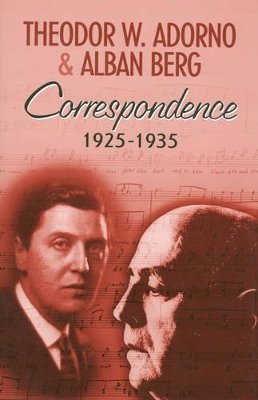
Stock image for illustration purposes only - book cover, edition or condition may vary.
Correspondence 1925-1935
Theodor W. Adorno
€ 19.49
FREE Delivery in Ireland
Description for Correspondence 1925-1935
Hardback. * The correspondence of Theodor Adorno and Thomas Mann documents a rare encounter of creative tension between literary tradition and aesthetic modernism spanning the years 1943-1955. * The letters offer the reader a fascinating insight into the lives of two of the most important figures of twentieth-century intellectual life. Editor(s): Lonitz, Henri. Translator(s): Hoban, Wieland. Num Pages: 168 pages. BIC Classification: BGA; JFC. Category: (P) Professional & Vocational. Dimension: 234 x 159 x 26. Weight in Grams: 536.
In December 1945 Thomas Mann wrote a famous letter to Adorno in which he formulated the principle of montage adopted in his novel Doctor Faustus. The writer expressly invited the philosopher to 'consider, with me, how such a work - and I mean Leverkuhn's work - could more or less be practically realized'. Their close collaboration on questions concerning the character of the fictional composer's putatively late works (Adorno produced specific sketches which are included as an appendix to the present volume) effectively laid the basis for a further exchange of letters.
The ensuing correspondence between the two men documents a rare encounter of creative tension between literary tradition and aesthetic modernism which would be sustained right up until the novelist's death in 1955. In the letters, Thomas Mann openly acknowledged his 'fascinated reading' of Adorno's Minima Moralia and commented in detail on the 'Essay on Wagner', which he was as eager to read as 'the one in the Book of Revelation consumes a book which tastes "as sweet as honey"'. Adorno in turn offered detailed observations upon and frequently enthusiastic commendations of Mann's later writings, such as The Holy Sinner, The Betrayed One and The Confessions of Felix Krull. Their correspondence also touches upon issues of great personal significance, notably the sensitive discussion of the problems of returning from exile to postwar Germany.
The letters are extensively annotated and offer the reader detailed notes concerning the writings, events and personalities referred or alluded to in the correspondence.
The ensuing correspondence between the two men documents a rare encounter of creative tension between literary tradition and aesthetic modernism which would be sustained right up until the novelist's death in 1955. In the letters, Thomas Mann openly acknowledged his 'fascinated reading' of Adorno's Minima Moralia and commented in detail on the 'Essay on Wagner', which he was as eager to read as 'the one in the Book of Revelation consumes a book which tastes "as sweet as honey"'. Adorno in turn offered detailed observations upon and frequently enthusiastic commendations of Mann's later writings, such as The Holy Sinner, The Betrayed One and The Confessions of Felix Krull. Their correspondence also touches upon issues of great personal significance, notably the sensitive discussion of the problems of returning from exile to postwar Germany.
The letters are extensively annotated and offer the reader detailed notes concerning the writings, events and personalities referred or alluded to in the correspondence.
Product Details
Format
Hardback
Publication date
2005
Publisher
John Wiley and Sons Ltd United Kingdom
Number of pages
168
Condition
New
Number of Pages
168
Place of Publication
Oxford, United Kingdom
ISBN
9780745623351
SKU
V9780745623351
Shipping Time
Usually ships in 7 to 11 working days
Ref
99-18
About Theodor W. Adorno
Theodor W. Adorno and Alban Berg
Reviews for Correspondence 1925-1935
"These letters provide us with a unique overview of the period and offer interesting and enlightening perspectives on even mundane aspects of daily life, as well as bringing us closer to the characters in question by allowing us a special insight into thir peculiar foibles and eccentricities." Musical Times "Major composers who befriend major philosophers, and vice-versa, are hardly numerous in the history of Western culture. Alban Berg's relationship with Theodor W. Adorno as teacher and colleague ranks with that between Richard Wagner and Friedrich Nietzsche, with the difference that Berg's and Adorno's genuine affection for each other, and their magnificent insight into each other’s work, remained constant to the end. Their correspondence is one of the landmarks of the early twentieth century and its music – a beacon of light in desperate times." John Deathridge, King’s College London "Sensitively translated and skillfully edited, the Adorno-Berg Correspondence represents scholarship eminently worthy of this extraordinary collection of letters between two twentieth-century intellectual-artistic giants. Adorno's composition lessons with Berg lasted for only a few months, but the impact transformed his understanding of modern music in particular and aesthetics in general. Berg, in turn, respected his pupil’s abilities as a composer, just as he clearly benefited, both intellectually and emotionally, from young Adorno’s profound insight into his master’s music. Though separated in age by nearly two decades, the two men formed a relationship born of deep affection and still deeper shared respect that lasted until Berg's untimely and sudden death. The collected correspondence makes available for the first time in English a body of texts that will add significantly to our understanding of Adorno and Berg as well as their breathtaking accomplishments." Richard Leppert, University of Minnesota
